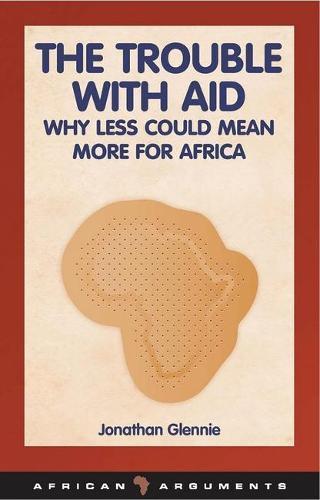Full Product Details
Author: Jonathan Glennie
Publisher: Bloomsbury Publishing PLC
Imprint: Zed Books Ltd
Dimensions:
Width: 13.40cm
, Height: 13.40cm
, Length: 20.40cm
Weight: 0.299kg
ISBN: 9781848130395
ISBN 10: 1848130392
Pages: 186
Publication Date: 15 October 2008
Audience:
College/higher education
,
Undergraduate
Format: Hardback
Publisher's Status: Active
Availability: Manufactured on demand

We will order this item for you from a manufactured on demand supplier.
Reviews
'Readable, reasoned yet radical; Glennie urges governments, campaigners and others to look beyond aid and consider other ways to help impoverished nations and citizens stand on their own feet.' Alex Wilks, European Network on Debt and Development 'Jonathan Glennie's excellent and immensely readable new book presents a compelling case for those of us who care about Africa not to demand ever more aid, but rather to seek the more fundamental changes in the global economy which could reduce dependency on aid and contribute to the ultimate eradication of poverty.' David Woodward, former head of New Global Economy Programme 'Jonathan Glennie offers a refreshing and insightful departure from the polarized views that have dominated the aid debate. Clearly and succinctly he challenges both aid optimists and aid sceptics with an in-depth analysis of the 'complex impacts' of aid on the lives of the poor and the institutions and governments of recipient countries. A must read' Samuel Gayi, UNCTAD 'At last a book that speaks frankly to the fundamentals of aid and how it is delivered. Ignore this book at your peril; this is an issue we cannot relegate to the sidelines of development' Charles Mutasa, Africa Forum and Network on Development and Debt (AFRODAD) 'The Trouble with aid certainly hits the spot. A concise and forthright critique and summary of the aid dilemma, its lack of prohibitive jargon and lofty rhetoric afford it wide and deserved appeal' New Agriculturalist
'Readable, reasoned yet radical; Glennie urges governments, campaigners and others to look beyond aid and consider other ways to help impoverished nations and citizens stand on their own feet.' - Alex Wilks, Director, European Network on Debt and Development 'Jonathan Glennie's excellent and immensely readable new book presents a compelling case for those of us who care about Africa not to demand ever more aid, but rather to seek the more fundamental changes in the global economy which could reduce dependency on aid and contribute to the ultimate eradication of poverty.' - David Woodward, former head of New Global Economy Programme, nef 'Jonathan Glennie offers a refreshing and insightful departure from the polarized views that have dominated the aid debate. Clearly and succinctly he challenges both aid optimists and aid sceptics with an in-depth analysis of the 'complex impacts' of aid on the lives of the poor and the institutions and governments of recipient countries. A must read' - Samuel Gayi, UNCTAD 'At last a book that speaks frankly to the fundamentals of aid and how it is delivered. Ignore this book at your peril; this is an issue we cannot relegate to the sidelines of development' - Charles Mutasa, Director, Africa Forum and Network on Development and Debt (AFRODAD) 'The Trouble with aid certainly hits the spot. A concise and forthright critique and summary of the aid dilemma, its lack of prohibitive jargon and lofty rhetoric afford it wide and deserved appeal' - New Agriculturalist
Author Information
Jonathan Glennie has worked as a policy analyst in several international development charities. He is currently Christian Aid’s country representative in Colombia. He has played a key role in campaigns in the United Kingdom and around the world, including the Make Poverty History campaign in 2005.




